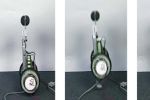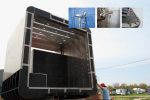Battle of the Ultra-Mobile Linux Laptops: Cloudbook vs. EeePC vs. My Old Thinkpad
In the industry as a whole, we're seeing this minimalist trend everywhere. In TVs, every manufacturer is lately focusing on producing not necessarily the largest displays, but the slimmest. Take Sony's OLED TV—people are so mesmerized by its three-millimeter thickness that they forget they're watching TV on an 11-inch screen that set them back $2,500—something high-end consumers would have laughed at a few years ago. We're also seeing it in computers—Apple's Macbook Air is currently their flagship objet d'envie, and it's most notable for what it doesn't have: bulk, thickness and weight, but also an Ethernet port and optical drive—again, missing features that would have been deal breakers on a $1,800 machine not too long ago.
A great benefit of this trend toward minimalism is that it is often associated with reduced costs. Both the EeePC and Cloudbook are priced at $400, which is pretty impressive considering what comes in the box. And with the Cloudbook being sold by Wal-Mart, the world’s largest retailer, things are starting to get mainstream.
But by far the most exciting thing about tech's new minimalism is the added longevity it gives to older hardware. As more and more people realize that the overwhelming majority of their time with a computer is spent surfing the Web, sending emails, working with office applications, or talking to their friends—all of which can be easily and comfortably accomplished on low-cost and often older hardware—they will also realize that with a little easy tweaking, the four-year-old laptop gathering dust in the closet might be perfectly capable of meeting their needs.
Notable here is the operating system's role in this trend. While the open-source Linux operating system can be run (and is very functional) on just about anything—from the latest high-performance screamer to the aforementioned old laptop in the closet —Windows Vista, for instance, can only run on systems built in the last year or two, if you're lucky. And although a version of the EeePC running Windows XP is forthcoming, it takes significantly more coaxing to run on lower-powered, non-standard hardware than Linux.
In the new world of the Linux ultraportable, the EeePC is still king, and when comparing it with the unpolished Cloudbook, it’s easy to see why [see the next page for our full comparison]. But the trend toward minimalism in hardware also allows older machines, like my four-year-old Thinkpad X31, to step back up to the plate. And that’s where things get interesting.
Let's take a closer look at the main contenders in the Linux-powered ultraportable world—the Asus EeePC and the Everex Cloudbook--and, as a control, my four-year-old IBM Thinkpad X31 running Ubuntu Linux. Sure, the X31 is not as crazy-svelte, but in its day it was about as small as they came, and still serves as an impressively compact workhorse to this day. And best of all, the three of them can be had for $400 (you can probably pick up an X31 for even less with some craigslist watching), so let's see what's possible with each.
7 Comments
Popular Tags
Regular Features

Featured
Gear & Gadgets
The MegaGoods Roundup
Our biggest collection yet: over 200 of the year's best gadgets, goods and gizmosBattle of the Ultra-Mobile Linux Laptops: Cloudbook vs. EeePC vs. My Old Thinkpad
How much portable Linux goodness can you get for $400?
Popular on Popsci
Most Viewed
Most Commented
Gear & Gadgets
- Control iTunes with the wave of a hand!
- Kogan to launch Australia's first Android based mobile
- SLR Battle Royale
- The Amazing Lego Mac Pro and More
- Middleweight Camera Championship
- Middleweight Camera Championship
- Headphones Tailored to Your Hearing
- Nokia’s Own Jesusphone
- Sony MDRNC500D noise cancellers tested
- Second hand copies of Windows are pure gold
Most Emailed
Gear & Gadgets
- Control iTunes with the wave of a hand!
- Kogan to launch Australia's first Android based mobile
- SLR Battle Royale
- The Amazing Lego Mac Pro and More
- Middleweight Camera Championship
- Middleweight Camera Championship
- Headphones Tailored to Your Hearing
- Nokia’s Own Jesusphone
- Sony MDRNC500D noise cancellers tested
- Second hand copies of Windows are pure gold









Comments
from werwer, www
i wouldn't call EeePC a hands down winner just yet.
Cloudbook was just released. EEE Pc was out for a few months, and initially they got some negative reviews as well.
Everex/gOS needs to catch its breath, and re-evaluate who is responsible for which bugs. gOS has lots of potentials especially for non techy-nerd crowd. Cloudbook is a bit of a rushed product that needed more time in QA cycle, they didn't need to set deadlines that were hard to make. seems like hardware and OS wasn't ready for marriage just yet. anyway, one hopes a few quick updates will fix the initial problems.
7 out of 9 people found this comment helpfulfrom Tualatin, Oregon
Just a couple things. First, the EeePC actually starts at $300 for the 2GB version. The lower price point wasn't mentioned in the article. There's also something to be said for having a new laptop with a warranty, which would be missed if one were to purchase a used PC. Lastly, the Eee runs XP very well, granted that some quick tweaking is involved (disabling the pagefile, system restore, and clearing out unnecessary components/files), but overall a very capable machine. Of course if someone has the cash, they should buy a full fledged laptop. But this works perfectly as a budget box or a super small traveler.
Oh, and the CloudBook sucks.
5 out of 5 people found this comment helpfulSeeing as how my family got a 350$(420$ with an upgrade to 2gb of RAM to make vista tolerable) toshiba labtop with a 1.8 ghz intel celeron, and Vista, I'd say that we beat all of these by far. Sure, it isn't ultracompact, butthats mostly just fashion, it doesn't really matter except for a few situations. Of course, I should probably dual boot, but I'm not going to mess with that, because my parents probably wouldn't like it, and probably don't care.
I don't understand quite why they're loved so much, because when you pay 100$ more, you can get a full sized labtop that has numerous upgrades, and a full windows OS. Of course, its probably going to be a pain of an OS, but you can always downgrade, or even if you're not that good with any sort of things with computers, just get one from Dell with XP. It does hurt a bit to pay 650 for a labtop with XP on it though...
The thing that makes me the most happy about these though are that people are getting exposure to linux, and that they might realize that they don't need Windows, and actually don't prefer windows.....
4 out of 9 people found this comment helpfulI got quite excited when the eee pc came out, but after trying one and seeing how much you have to squint at the screen to use the wordprocessor, I decided to look at the alternatives.
I actually settled on an IBM X31 (before reading your article - honest!), and got hold of a second-hand one with 1.7Ghz processor, 1GB RAM and 40GB HD on ebay for the same money as an eee pc.
Its not quite as small or light as an eee pc, but the screen and keyboard more than make up for that, and it's built to last. It runs XP, and for wordprocessing, the web and most other applications it runs absolutely fine. I'm more than happy!
5 out of 5 people found this comment helpfulPeople who buy an ASUS eee in order to get a super cheap laptop are bound to be disappointed by the limitations of the machine.
I have mine for a month now and am extremely happy with it because I treat it as a lightweight, rugged "computing companion" that I can take along everywhere I go. It allows me to read my mail, browse the web, send IMs and do PowerPoint presentations without having to carry a laptop. Since it is very small, it is easy to use anywhere. At the same time, I would not use it to create or edit complex documents.
The main application that I miss is a nice personal information manager (PIM) that would easily synchronize with Outlook. I would be willing to pay real cash for it.
2 out of 2 people found this comment helpfulI still maintain that the best portable computer to date was the 12" Powerbook w/ the 1.5 ghz processor. Superdrive, 1/25gigs of ram, reasonable processor and energy efficent enough to watch a full length movie, surf the web, and do office tasks. Its the exact same dimensions as a piece of paper. Weight = 4.6 lbs. And you can find them on ebay for reasonable prices.
3 out of 5 people found this comment helpfulWish Apple would come out with a 12" MacBook Pro.
1 out of 2 people found this comment helpful